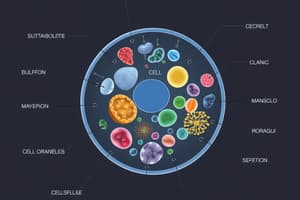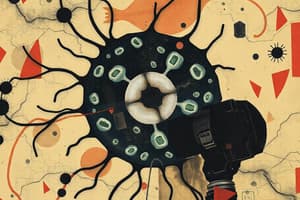Podcast
Questions and Answers
What is one key feature that distinguishes plant cells from animal cells?
What is one key feature that distinguishes plant cells from animal cells?
- Presence of a nucleus
- Presence of mitochondria
- Presence of ribosomes
- Presence of chloroplasts (correct)
All cells have the same structures and functions.
All cells have the same structures and functions.
False (B)
What is the function of the nucleus in a cell?
What is the function of the nucleus in a cell?
Controls and directs the activities of the cell
Plant cells have a tough cell wall made largely of __________.
Plant cells have a tough cell wall made largely of __________.
Match the following structures with their functions:
Match the following structures with their functions:
Which of the following statements is true regarding vacuoles?
Which of the following statements is true regarding vacuoles?
All organelles in a cell are visible under a compound microscope.
All organelles in a cell are visible under a compound microscope.
What process do chloroplasts in plant cells perform?
What process do chloroplasts in plant cells perform?
Cells are made from other cells through __________.
Cells are made from other cells through __________.
What is the primary role of the cell surface membrane?
What is the primary role of the cell surface membrane?
Flashcards are hidden until you start studying
Study Notes
Cell Theory and Structure
- Cells serve as the basic unit of structure and function in living organisms.
- Three fundamental concepts of cell theory:
- Cells are building blocks of living tissue.
- They represent the smallest unit of life.
- Cells arise from pre-existing cells through division.
- Two additional concepts:
- Cells contain genetic blueprints for growth and development.
- Cells are the site of all metabolic chemical reactions.
Characteristics of Cells
- No "typical" cell exists; there is a significant diversity among cell types.
- Common structures in most cells include:
- Nucleus: Controls and directs cellular activities.
- Cytoplasm: Site of metabolic reactions.
- Cell Surface Membrane (Plasma Membrane): Regulates entry and exit of substances.
Organelles
- Organelles are specialized structures within cells, each serving specific functions.
- Organelles are typically too small to be observed at low magnification.
- Electron microscopy has advanced understanding of organelle structure.
Differences Between Plant and Animal Cells
- Cell Wall: Present in plant cells, composed primarily of cellulose; absent in animal cells.
- Vacuoles:
- Plant cells often have a large, permanent vacuole for storage.
- Animal cells may have smaller, temporary vacuoles.
- Chloroplasts: Present in green plant cells for photosynthesis; not found in animal cells.
- Centrosome: Located near the nucleus in animal cells; aids in nuclear division; absent in plant cells.
- Energy Storage:
- Animal cells typically store energy as glycogen.
- Plant cells usually store energy as starch.
Visual Insights
- Transmission electron microscopy (TEM) reveals the intricate structure of organelles, including membrane composition, and highlights the fluid surrounding the organelles within living cells.
Studying That Suits You
Use AI to generate personalized quizzes and flashcards to suit your learning preferences.




